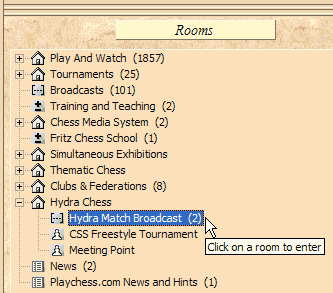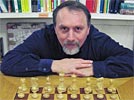


ChessBase 17 - Mega package - Edition 2024
It is the program of choice for anyone who loves the game and wants to know more about it. Start your personal success story with ChessBase and enjoy the game even more.
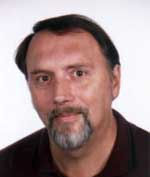 "Adams
can beat Hydra"
"Adams
can beat Hydra"This assessment is given by Correspondence Chess Grandmaster Arno Nickel from Berlin, who recently won a match against Hydra by 2:0 in a correspondence chess match, after a six month struggle. On the occasion of the forthcoming match Hydra vs. Adams the correspondence chess server chessfriend.com asked Arno Nickel about his experience with the so-called "hardware monster".
Chessfriend.com: You won two correspondence match games against the previous version Hydra Chimera. Would you draw any conclusions from this match for the man/machine event in London? What is your bet?
GM Arno Nickel: Well of course, correspondence chess and over-the-board chess are nowadays two extremely different disciplines, more so than ever, because correspondence players in contrast to o-t-b players have full access to computer engines and databases. Nevertheless my test games against Hydra (I think, we should call them this way) show some aspects of the potential of Hydra's chess abilities as the successor to Deep Blue. In the two games, where I played White against the Sicilian and with Black against the Tarrasch-System in the French Defence, Hydra disregarded principles and unnecessarily got into difficulties, once in the middlegame and the again in the endgame. If the positions are not guided by tactics, I wouldn't be surprised, if a super grandmaster like Adams will give the machine a thrashing on the board. A lot depends if he manages to neutralize Hydra's tactical power and in reaching human type positions, where long sighted plans are called for.
This in fact occurred to some of the leading grandmasters, who played Hydra in Bilbao in 2004 and who failed to follow your strategy. Namely ex-FIDE World Champion Ponomariov and the youngster Karjakin (both from Ukraine), while the Bulgarian Top-GM Topalov was the only one to take half a point from the machine and even had winning chances at one stage. When this became possible...
Nickel: ...exactly, it was in this game, where Hydra also blundered positionally. You cannot eliminate such deficits overnight, and without intensive training against very strong players...
However Hydra Scylla is five times faster than the previous version, which "only" calculated about 40 millions moves per second.
Nickel: As said before, in positional situations such numbers are completely meaningless. Really important is the direction in which the program goes and how it evaluates the positions. Once the machine has got the wrong idea, it will not correct itself by deep calculation in quiet positions. This was evident in my correspondence games, where Hydra had lots of time and could calculate much deeper than the new Hydra will be able to in a classical tournament game with four to six hours for all of moves. The results were not better in most of the critical positions.
Some deficits of Hydra were also seen in the recent PÂL/CSS-Freestyle Tournament on playchess.com, where the sea monster didn't even reach the quarter finals.
Nickel: Well, this is of course a hot potato since Hydra as in correspondence chess had to play against strong players, amongst them even some FIDE grandmasters who could use engines as in "advanced chess". I was also surprised by Hydra's failure, but on consideration I realised that all programs including Shredder 9, Fritz 8 and Junior 9 which were also running on strong machines, got into trouble, when playing without human advice. Probably this wouldn't have happened with shorter time limits, let's say 15 minute games or even shorter, but in one hour games (one hour per player plus 15 sec. per move), human chess competence can already show its qualities in tandem with engines. By the way, I also participated in this very interesting event and didn't manage to reach the quarter finals either. However in the process I met Hydra again and played a nice game which was drawn after 102 moves. The sea monster must have gotten tired of attacking my fortress without success.
Once again what is your bet on the match Hydra-Adams...?
Nickel: Okay, it will very hard for any human being, but as I always hold on for humanity, and especially as Michael Adams is a gifted positional player, I think he might achieve a draw, that means 3:3. Maybe he can even beat Hydra, if he is able to completely control his emotions and avoid any unclear complications. Should this be so, he could succeed where Kasparov failed when playing Deep Blue eight years ago. This would mean that humans have learned since then even though the computers didn't get weaker, but obviously stronger since that time. Hydra, don't forget, is supposed to be stronger than good old Deep Blue!
Postscript: the correspondence chess match Hydra vs. Nickel on the Chessfriend server isn't over yet. The Hydra Team is ready to continue the match against GM Nickel by playing two further games. This will take place after the match with Adams.
The multi-processor hardware system “Hydra” will make its worldwide debut in London on 21-27 June, playing a six-game match against the UK’s top GM Michael Adams. The event will take place at the Wembley Centre in London, with a purse of $150,000 (£80,000) up for grabs. The prize fund will be given to the players on a per-game basis, the winner of each game getting $25,000, whereas in case of a draw both opponents get $10,000 each. If Adams loses a game he apparently gets nothing.
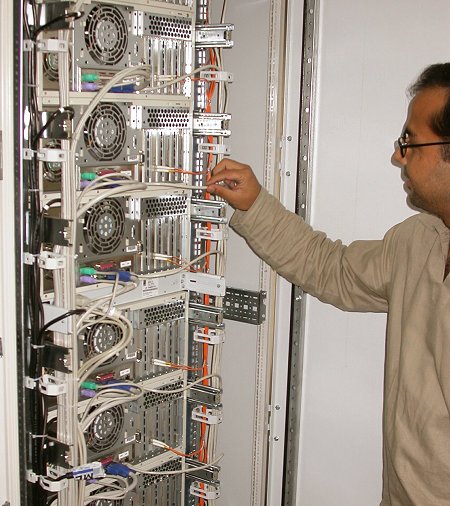
Hydra is a hardware-driven chess machine. The basic hardware consists of a 32-processor cluster with the same number of FPGA hardware chess cards. These do the brute calculations at the ends of the search tree. The Xilinx Field Programmable Gate Arrays are able to reach much greater computational speeds for specific tasks than the general-purpose 3.06 GHz Xeon processors in the host machine. The Xeons only do the initial part of the search. On this hardware configuration Hydra has a processing power of 100 billion calculations – or 200 million chess moves – a seconds.

England's top GM Michael Adams, born on November 17, 1971, lives in Taunton, Devon and London. He first won the British Championships in 1989 at the age of 17, becoming a grandmaster in the process. Adams was awarded Player of the Year by the British Chess Federation in 1990, 1993-96 and 1998-2002 – a record number of titles. He has been an international chess professionally for nearly two decades, reaching his highest FIDE ranking of third in the world in 2002. He is currently ranked number one in Britain and number seven worldwide, with an Elo rating of 2741.
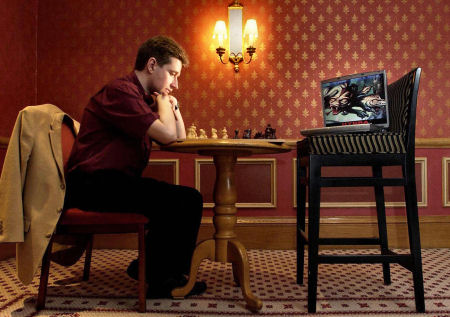
| Game 1 | 21 June 2005, 3 PM |
| Game 2 | 22 June 2005, 3 PM |
| Game 3 | 23 June 2005, 3 PM |
| Game 4 | 25 June 2005, 3 PM |
| Game 5 | 26 June 2005, 3 PM |
| Game 6 | 27 June 2005, 3 PM |
The games will be covered live on Playchess.com in a special broadcast room:
